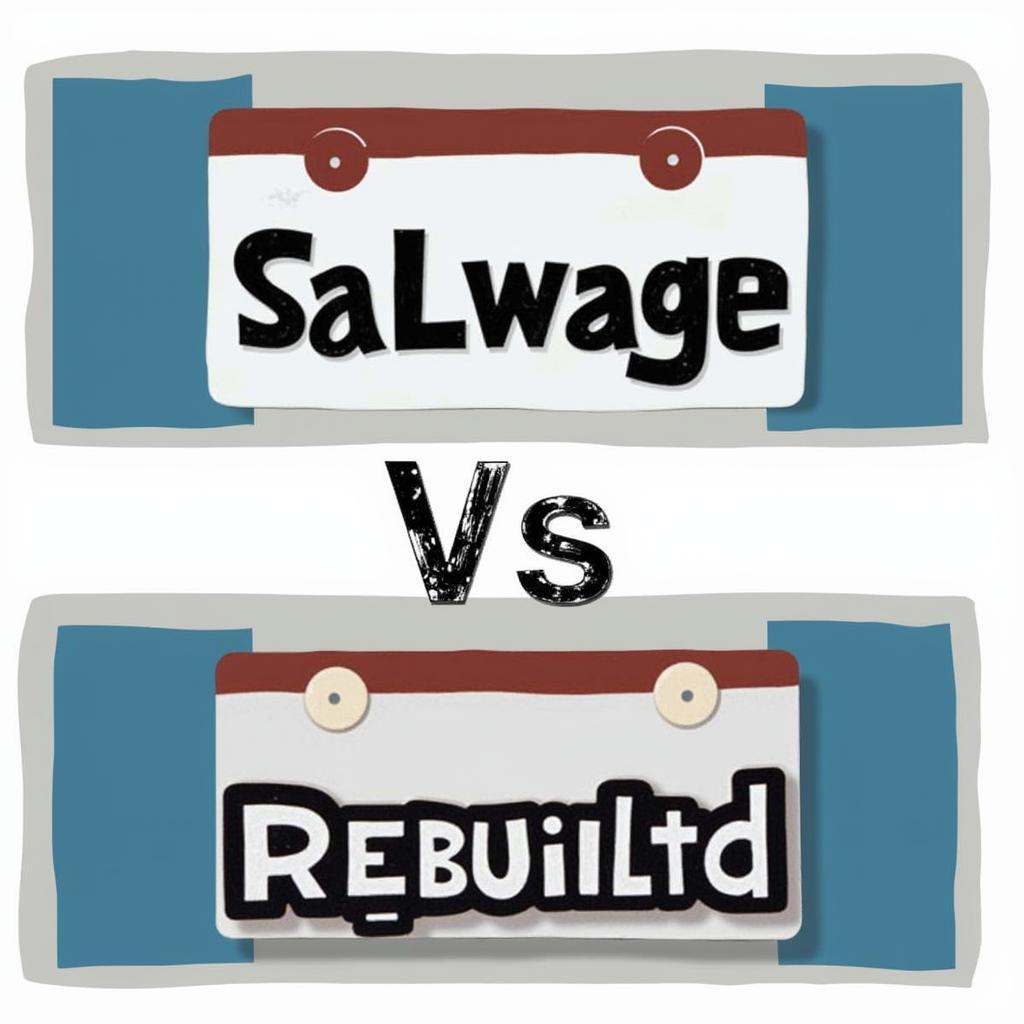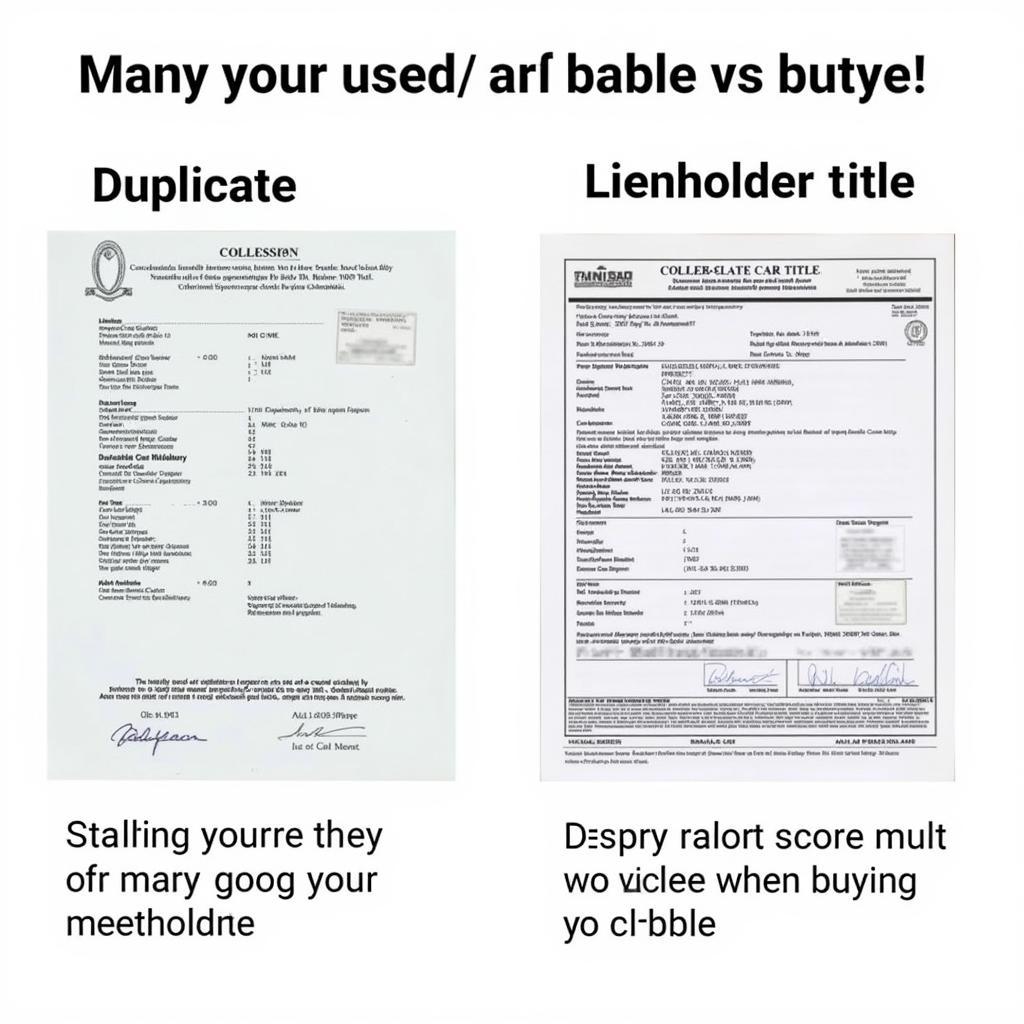When purchasing a used car, ensuring a clean title is crucial. A title problem can range from minor administrative issues to significant legal hurdles, impacting your ownership and potentially leading to financial losses. Understanding what constitutes a title problem when purchasing a used car is essential for a smooth and secure transaction. This article will equip you with the knowledge to navigate the complexities of used car titles, identify potential red flags, and protect yourself from future headaches.
Understanding Car Titles
A car title is a legal document that establishes ownership. Think of it like the deed to a house, but for your car. It contains crucial information, including the Vehicle Identification Number (VIN), the registered owner’s name and address, and any liens against the vehicle. A clean title indicates sole ownership, free of any encumbrances.
Common Title Problems When Purchasing a Used Car
Several issues can arise with a car title, creating potential problems for the buyer. These range from relatively minor administrative errors to significant legal challenges that could impact your ability to own and operate the vehicle.
Salvage Title
A salvage title is issued when a vehicle has been declared a total loss by an insurance company, usually due to significant damage from an accident, flood, or fire. While these vehicles can be significantly cheaper, they often come with hidden mechanical problems and may be difficult to insure.
Rebuilt Title
A rebuilt title indicates that a salvaged vehicle has been repaired and inspected, making it roadworthy again. However, purchasing a car with a rebuilt title still carries risks. The quality of repairs can vary significantly, and some underlying damage may not be apparent.
Duplicate Title
A duplicate title is issued when the original title is lost, stolen, or damaged. While this is usually a straightforward administrative issue, it’s important to ensure the seller has legitimately obtained the duplicate title and there are no outstanding liens against the vehicle.
Lienholder Title
A lienholder title indicates that a lender or financial institution holds a financial interest in the vehicle. This means the vehicle is being used as collateral for a loan. Purchasing a car with a lien requires ensuring the lien is released upon full payment to avoid legal complications.
 Salvage and Rebuilt Titles
Salvage and Rebuilt Titles
Incorrect Information on the Title
Simple errors, like a misspelled name or incorrect address, can create complications down the line. While these are often easy to rectify, it’s crucial to address them before completing the purchase to avoid delays and additional paperwork.
Open Title
An open title, also known as an unbranded title, is the ideal scenario. It signifies a clear history, free of any liens, salvage designations, or other issues. This is what you should aim for when buying a used car.
Title Washing
Title washing is an illegal practice where a salvage title is “cleaned” by transferring the vehicle through multiple states with looser regulations. This disguises the vehicle’s history, potentially hiding significant damage from unsuspecting buyers.
 Duplicate and Lienholder Titles
Duplicate and Lienholder Titles
Protecting Yourself From Title Problems
How can you protect yourself? First, always obtain a vehicle history report from a reputable source like Carfax or AutoCheck. This report will reveal any past accidents, title brands, and other critical information. Secondly, verify the seller’s identity and ensure they are the legal owner of the vehicle. Thirdly, if you have any doubts, consult with an automotive attorney before signing any paperwork.
“A vehicle history report is your best defense against hidden title problems,” advises John Smith, a seasoned automotive technician at Smith Automotive Repair. “It’s a small investment that can save you thousands of dollars and countless headaches down the road.”
What if I Discover a Title Problem After the Purchase?
Discovering a title problem after the purchase can be a stressful situation. Depending on the nature of the problem and the local laws, you may have legal recourse against the seller. Contact an attorney specializing in automotive law to discuss your options.
Conclusion
Understanding what constitutes a title problem when purchasing a used car is paramount. From salvage titles to title washing, being aware of potential pitfalls will protect your investment and ensure a smooth ownership experience. Remember, a clean title is a fundamental aspect of a secure used car purchase. Don’t hesitate to connect with AutoTipPro at +1 (641) 206-8880 or visit our office at 500 N St Mary’s St, San Antonio, TX 78205, United States for expert advice and assistance.
“A careful title check can be the difference between a dream car and a nightmare,” adds Jane Doe, a legal expert specializing in automotive transactions. “Don’t skip this critical step in the used car buying process.”
FAQ
-
What is the most common title problem? Salvage titles are one of the most common and potentially problematic title brands.
-
Can I insure a car with a salvage title? Yes, but it may be difficult and more expensive.
-
How can I check for liens on a car? A vehicle history report and a check with your local DMV can reveal liens.
-
Is a duplicate title a serious problem? Not usually, but it’s important to verify its legitimacy.
-
What is the difference between a salvage and a rebuilt title? A salvage title means the car was totaled; a rebuilt title means it was repaired after being salvaged.
-
Can I drive a car with a salvage title? This depends on state regulations. In some states, salvaged vehicles cannot be legally driven on public roads.
-
How do I avoid title problems when buying a used car? Thorough research, a vehicle history report, and professional advice are key.




Leave a Reply